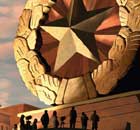Society
Expert: Horses in terracotta army 'castrated'
(Xinhua)
Updated: 2010-03-01 16:20
 |
Large Medium Small |
XI'AN -?Most of the clay horses unearthed from the mausoleum of Qinshihuang, the first emperor of a united China, had been "castrated", a Chinese archeologist said after studying more than 600 of the life-sized animals.
All the 520 horses that pulled chariots in the terracotta army, unearthed from the mausoleum on the outskirts of Xi'an, capital of the northwestern Shaanxi province, had penises but no testes, said Yuan Jing, an archeologist with the Chinese Academy of Social Sciences.
The situation varied, however, with the 116 cavalry horses, he said. "Some of them were castrated but many others were not."
| ||||
Written descriptions of castrated pigs have previously been found on shells and bones at least 3,000 years old, and Yuan said these were the earliest evidence of animal castration ever found. "These indicate that castration of animals was prevalent more than 2,000 years ago."
"The new finding will help our research into how once unruly horses were tamed by humans and played a role on the battlefield," Yuan said. "It might also help to unravel more secrets about the terracotta army."
Xi'an-based archeologist Hu Songmei, however, said it might be still too early to draw any conclusions. "We need to see proof of castration from horse remains."
Hu, a researcher with Shaanxi Provincial Institute of Archeology, said research on horse skeletons might reveal signs of castration.
In one of the latest findings, several horse skeletons were unearthed near Chang'an district, in the heart of the ancient Chinese capital.
Most experts believe the terracotta army of archers, infantrymen and charioteers was designed to help Qinshihuang, the first emperor of the Qin Dynasty (221 BC - 207 BC), rule in the afterlife.
The army was one of the greatest archeological finds of modern times. It was discovered in Lintong county, 35 km east of Xi'an, in 1974 by peasants who were digging a well.
The discovery, listed as a world heritage site by UNESCO in December 1987, has turned Xi'an into one of China's major tourist attractions.











